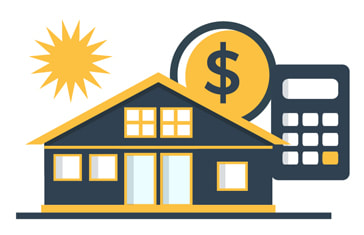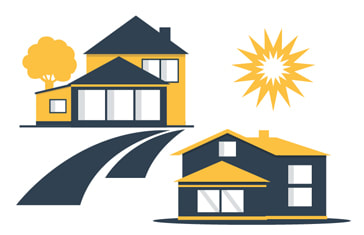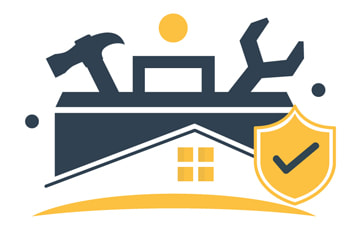What's the Average Building Cost Per Square Metre in New Zealand?
Our guide explains everything you need to know to plan a home build with confidence.
Updated 11 July 2024
Summary
We cover:
Summary
- Building costs continue to be unstable, and 2024 looks to bring frustration to home builders as costs increase and building companies go bust.
- Overall, the average building cost per square metre in New Zealand is currently $2,459 (2022 data) having risen from $2,359 in 2020. However, this shouldn't be relied on given the global materials shortage, varying council consent costs and, of course, the specifications of what you're building.
- Building a home has its advantages - complete control over the design, fit-out, and interiors. However, building a home is expensive, time-consuming, stressful and, now, increasingly uncertain when it comes to determining a budget.
- If you doubt whether or not you can afford it, we urge you to challenge yourself before starting the process. All too often, people run out of money; part-completed home builds are then on-sold at a huge loss.
- To help you plan your build and budget, our guide sets out the average building cost per square metre and must-know relevant building costs.
We cover:
What is the average building cost per square metre?
Interest.co.nz published comprehensive average build cost data in November 2021 - you can access the report and tables here. The data is sourced from StatsNZ, which collates all council consent applications. Overall, the average cost per square metre is around $2,500 for houses and around $2,300 for apartments. The average costs exclude external items - land, driveways, landscaping and fences, and earthworks such as drainage and retaining walls. Industry experts believe the external items can add 30% to 50% of the completed home cost, depending on site size, contours and distance from available services.
Important: The consent application figures which flow through to StatsNZ figures are linked directly to the Building Research Association of New Zealand (BRANZ) levy calculation. These figures are not always reliable, given BRANZ charges applicants 0.1% of the contract value (above $20,000) of every construction project put forward for building consent in New Zealand. This levy is payable by the builder; industry experts believe that many savvy clients and builders try to minimise this levy cost. Hence, many contract values are likely to be understated, which will reduce the StatsNZ data's accuracy.
Disclaimer - The home building market is unstable and rising material prices may increase the average build cost. Nonetheless, the table below estimates what a new house will cost (excluding land and consent fees).
Important: The consent application figures which flow through to StatsNZ figures are linked directly to the Building Research Association of New Zealand (BRANZ) levy calculation. These figures are not always reliable, given BRANZ charges applicants 0.1% of the contract value (above $20,000) of every construction project put forward for building consent in New Zealand. This levy is payable by the builder; industry experts believe that many savvy clients and builders try to minimise this levy cost. Hence, many contract values are likely to be understated, which will reduce the StatsNZ data's accuracy.
Disclaimer - The home building market is unstable and rising material prices may increase the average build cost. Nonetheless, the table below estimates what a new house will cost (excluding land and consent fees).
Location |
Average Size (Total Square Metres) |
Average Cost to Build |
Average Build Cost (per Square Metre) |
Auckland |
212 |
$526,886 |
$2,482 |
Waikato |
188 |
$456,101 |
$2,420 |
Bay of Plenty |
172 |
$435,398 |
$2,526 |
Wellington |
182 |
$522,943 |
$2,872 |
Canterbury |
193 |
$413,623 |
$2,143 |
Otago |
205 |
$605,315 |
$2,950 |
New Zealand Average |
195 |
$479,271 |
$2,459 |
Know this: New Zealand has seen a steep rise in building costs from coast to coast, with average prices escalating at double the usual pace between July and September 2021, bringing the figure to its highest ever level. This Stuff article outlines the higher costs and some the problems caused. With an abrupt increase in timber and cladding prices sending construction costs up by 5.5%, a notable jump in land costs – increasing by 50% over the past decade – and a rise in highly-concentrated markets, specifically related to wood products, building costs per square metre are reaching unsustainable levels.
While the scarcity of resources and skilled tradespeople have been held responsible for the rise in building costs, studies show that the upward trajectory began far before the global crisis, with house prices soaring by 57% between December 2009 to June 2018 in New Zealand. Interestingly, labour and material costs didn't rise at the same rate, with labour rising by 17% and plasterboard, cement, and concrete increasing by 13% in the same timeline, suggesting that a combination of factors are responsible for the sharp surge.
The table below outlines a range and uses the most recent home insurance rebuild cost data available, which we believe is more accurate than historical media coverage.
While the scarcity of resources and skilled tradespeople have been held responsible for the rise in building costs, studies show that the upward trajectory began far before the global crisis, with house prices soaring by 57% between December 2009 to June 2018 in New Zealand. Interestingly, labour and material costs didn't rise at the same rate, with labour rising by 17% and plasterboard, cement, and concrete increasing by 13% in the same timeline, suggesting that a combination of factors are responsible for the sharp surge.
The table below outlines a range and uses the most recent home insurance rebuild cost data available, which we believe is more accurate than historical media coverage.
Example Average Build Costs for New Home Construction (2022 data)
Value |
Standard Home |
Quality Home |
Prestige Home |
Average cost per square metre* |
$2,395 |
$2,820 |
$3,536 |
Average Cost to Build a 2-bedroom home (156 square metres) |
$391,636 ($2,510 per sq m) |
$464,195 ($2,875 per sq m) |
$593,473 ($3,804 per sq m) |
Average Cost to Build a 3 or 4-bedroom home (200 square metre) |
$479,024 ($2,395 per sq m) |
$564,000 ($2,820 per sq m) |
$707,200 ($3,536 per sq m) |
Average Cost to Build a 4+ bedroom super-sized home (270 square metres) |
$659,794 ($2,444 per sq m) |
$774,300 ($2,868 per sq m) |
$979,342 ($3,627 per sq m) |
- Important: The costs above exclude professional fees, GST and building consent costs. The pricing is based on a flat/gentle land and a build that is architect designed. The properties are based in Auckland and are all single story. *Our headline average costings are based on a three-bedroom home that is 200 square metres in size. Again, all prices exclude GST.
- Average size homes are not New Zealand standard - for the latest data, please see building consent data and general information from StatsNZ.
- Data sourced from our Home Insurance Calculator and CoreLogic.
Can building cost averages be used as a reliable guide?
Ultimately, 'averages' should be treated as a general estimate – not a rule of thumb. Considering many variables, it is crucial to seek a bespoke quote that covers everything before finalising a budget. This way you avoid the risk and stresses of an under-funded end-to-end build. Homes are only built once - not having to take shortcuts because of unplanned costs means you won't need to compromise.
Know This: The 'Cost per Metre' Ranges Widely
While basic homes lacking features may average at $2,000 per square metre, the same sized home brimming with luxury finishes, cutting-edge architecture, and a focus on longevity may garner a bill of $5,000 per square metre – or beyond.
With each home, requirement, and circumstance comes varying costs, but we have outlined key points to consider:
Know This: The 'Cost per Metre' Ranges Widely
While basic homes lacking features may average at $2,000 per square metre, the same sized home brimming with luxury finishes, cutting-edge architecture, and a focus on longevity may garner a bill of $5,000 per square metre – or beyond.
With each home, requirement, and circumstance comes varying costs, but we have outlined key points to consider:
- If you're responsible for a new build, often-costly design fees will be wrapped into your cost per square metre, inevitably increasing the price.
- Building consents are expensive, and many take longer than they should to be approved. Using data from Auckland Council, for projects valued at under $4,999, $1,130 is charged for building applications, going up to $9,750 for projects valued at over $1,000,000. However, that's just the start of the costs for most applications.
- Building consents involve a lot of fees, and councils throughout New Zealand are happy to charge them. More costs should be expected to amend plans, gain a certificate of acceptance, or obtain a code compliance certificate. Overall, building consent costs (and time) should not be underestimated - it's the cause of frustration for many aspiring home builders, and the process needs to be managed carefully.
- As an example, a New Zealand Herald article in 2018 criticised the Auckland Council charging $69,000 in building consent costs, described as "excessive costs, inefficiencies and major delays".
- If you choose to opt for a project manager, architect, or more specialised personnel, such as a structural engineer, you should expect to see a significant rise in cost per square metre. Generally, between 5-10% of the building value will go directly to your architect.
- If you decide to select premium materials or building techniques, such as imported timber instead of composite cladding or triple-glazed windows to combat noise pollution, there will be a natural snowball in costs. In New Zealand, builders generally put a markup of around 10% on the cost of building materials.
Why do costs per square metre vary?
To understand why there isn't a set per-square metre price, it's important to look at your project from a builder's perspective:
Beyond the costs incurred from personal preferences, homes with different dimensions come with different needs. Homeowners must make design decisions that use the space to their advantage, position the windows to optimise natural light, utilise the materials that work for their lifestyle, and shape the layout around the needs of their family. These considerations and decisions cost money and much more than many people realise.
Important: Establishing a Provision for Overruns
- For example, take Home' 1' and Home' 2'; identical in size when going by square meterage but wholly unique in dimensions.
- If the owner of Home 1 opted for a 'basic' build with wall cladding, and the owner of Home 2 opted for intricate masonry, expansive windows, a cosy feel through extra timber, the costs will be different.
- In this case, Home 2 would far surpass Home 1 in labour fees and material costs.
Beyond the costs incurred from personal preferences, homes with different dimensions come with different needs. Homeowners must make design decisions that use the space to their advantage, position the windows to optimise natural light, utilise the materials that work for their lifestyle, and shape the layout around the needs of their family. These considerations and decisions cost money and much more than many people realise.
Important: Establishing a Provision for Overruns
- With the design element accounting for around 5% to 10% of the overall build cost, this 'small' part can vastly impact the overall cost per square metre.
- For this reason, design and planning should be approached with caution when aiming to stay within a pre-determined budget. If your finances are limited, it is worthwhile to consider establishing an allowance for contingencies – around 10% is generally sufficient, increasing to 20% (if your build is particularly complex or risky).
- Why is this important? If you go over budget, you'll need to find the money to immediately pay for the work to keep a build on schedule. Under-budgeted home builds cause a lot of problems in the moment and later on. With careful budgeting, they can be avoided upfront.
Frequently asked questions
There's no single number as to the average cost; we answer common queries below to help you make an informed decision and know the hidden costs of building off a plan.
How much does building consent cost?
It depends on what council you're working with, the scope of your plans, and of course, the costs incurred preparing the draft plans. The consent process can be expensive and lengthy.
How can I get an accurate building cost figure?
To gain a reliable insight into costs, you will need to devise a building plan, including concept drawings, building materials, and relevant features. From there, a quantity surveyor should provide a precise estimate. It's near-impossible to get an accurate estimate without complete plans. Due to increased building costs, it's best to have a buffer for overruns. 10% of the total build budget should be the minimum.
Will building costs in New Zealand ever come down?
Right now, it's a perfect storm for high costs: growth of land prices, a shortage of tradespeople, and a rise in building materials costs due to global supply constraints are all ongoing issues and existed before COVID-19. Together, they have long been regarded as responsible for the jump in building costs. Materials are seeing a 20 to 25% increase over the last five years per this November 2021 Stuff.co.nz article. Experts believe that costs will continue to rise for the foreseeable future, meaning you should budget more than you expect to pay. This is bad news for anyone with bare land, drawing up plans or looking to build later on.
Do I need to hire a project manager, or can the builder and I manage it together?
It depends on the scope of your build. If it's a standard build, you can likely (and will want) to be involved and manage the project. However, if it's a complicated build and you don't have the experience, a project manager can reduce costs. This is because if there are going to be delays, mistakes or mixups, a project manager can anticipate such issues and work to solve them before they arise. Otherwise, such problems can blow out the daily costs you're paying your builder and everyone else involved in the construction.
How can I ensure I choose the right builder?
Due diligence is key to a streamlined build, so we recommend compiling a checklist of must-haves before you give your builder the green light. Ensure you explore their credentials, reviews, estimated timeline, and relevant experience. If they subcontract, repeat the process.
Before making any agreements, seek guidance from a legal professional who can examine your contracts - our guide to builders in Auckland has more details.
Before making any agreements, seek guidance from a legal professional who can examine your contracts - our guide to builders in Auckland has more details.
Why are builder quotes higher than I budgeted for?
- Builders incur many overhead costs, which prospective homeowners sometimes forget. Specifically, the quote for a new build isn't just driven by "time plus materials".
- The builder's overhead includes ACC, compliance costs, business liability insurance, vehicle costs, marketing expenses, admin support costs, tax and accountancy fees and sub-contractor costs.
- The builder then has to guarantee the build for the next ten years as part of the contract. On top of this is a 15% GST charge.
- The margin they make reflects the risk, the time spent on the build, completing it to plan, and the overhead costs.
How can I keep my build costs down?
There are various ways to mitigate ever-expanding build costs, whether you decrease your project scope, go the DIY route, opt for more affordable building materials, or avoid homes that require consent to change.
Structural work, such as floors, walls, roof, columns, and foundations, needs to be handled by qualified tradespeople and those needing specialist certification, such as waterproofing, damp proofing, and fire systems. Otherwise, you can take on the work yourself, avoiding labour costs. Many New Zealanders do this while building a house if they have flexible working arrangements, are self-employed or apply for extended leave.
Be decisive - our research team received guidance from leading New Zealand home building industry players. One expert suggested making sure your design consultant has had time to prepare a complete set of drawings and you have made all materials/fitting selections. 'Grey areas' and TBC items add cost for the unknown. If you portray yourself as a very decisive client, your builder will not price as much risk for potential delays, and your build cost will reduce.
Structural work, such as floors, walls, roof, columns, and foundations, needs to be handled by qualified tradespeople and those needing specialist certification, such as waterproofing, damp proofing, and fire systems. Otherwise, you can take on the work yourself, avoiding labour costs. Many New Zealanders do this while building a house if they have flexible working arrangements, are self-employed or apply for extended leave.
Be decisive - our research team received guidance from leading New Zealand home building industry players. One expert suggested making sure your design consultant has had time to prepare a complete set of drawings and you have made all materials/fitting selections. 'Grey areas' and TBC items add cost for the unknown. If you portray yourself as a very decisive client, your builder will not price as much risk for potential delays, and your build cost will reduce.




